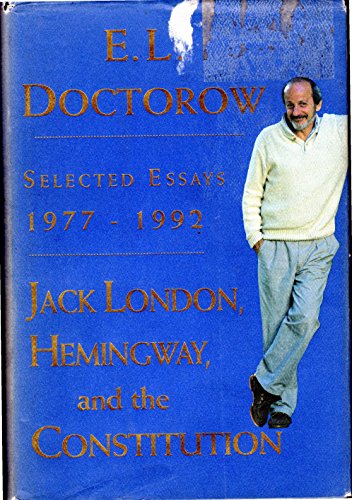Synopsis
In a collection of reflective essays, the author of Ragtime covers a wide variety of topics, from such writers as Dreiser and Hemingway, to nineteenth-century New York, to contemporary cultural ailments.
Reviews
The moral and political concerns that drive Doctorow's novels inform these 14 wholly engaging essays and reviews reprinted from the Nation , the New York Times Book Review , Harpers , etc. He presents masterful biographical-critical sketches of Jack London, "our first writer-hero," who championed mutually exclusive ideas of democratic socialism and pseudoscientific racism; and Ernest Hemingway, whose unfinished novel The Garden of Eden arguably contains his most impressive heroine. Doctorow also illuminates Theodore Dreiser's moral vision, Thoreau's Walden , George Orwell's 1984 and poet James Wright, his undergraduate classmate at Kenyon from 1948 to 1952. His eloquent piece, "A Citizen Reads the Constitution," taps that document's revolutionary democratic spirit. Elsewhere Doctorow faults the "disastrous" policies of Bush and Reagan, analyzes the emotive appeal of popular songs, excoriates apolitical novelists and plunges us into raw, cosmopolitan, riot-prone 19th-century New York City.
Copyright 1993 Reed Business Information, Inc.
A miscellaneous collection of nonfiction that will do little to enhance Doctorow's reputation as a writer. Almost all of the book reviews, speeches, introductions, and political commentaries included here were solicited by editors, and seem relatively uninspired. Doctorow's literary criticism is casual to a fault, revealing a not-surprising affinity for the social realism of ``hack genius'' Jack London, the materialist vision of Dreiser, and the antistatist satire of Orwell. Doctorow celebrates the signs of incipient feminism in Hemingway's unfinished Garden of Eden and shares Papa's monosyllabic style (``His stuff was new. It moved''). A fierce if unoriginal critic of the Reagan years, he relies on boilerplate polemics: His Reagan-bashing profile is stale, and his Brandeis commencement speech makes a facile link between social decline and Reaganomics. His introduction to the Constitution as ``the sacred text of secular humanism'' is reader-friendly, but his bloated declaration of ``The Beliefs of Writers'' too readily accepts and expands Shelley's conceit that ``poets are the unacknowledged legislators of the world.'' Doctorow is much better--more in tune with his fictive voice--when he writes around a topic: His meditative re-creation of 19th-century Manhattan's sights and sounds is hypnotizing; an essay on ``standard'' songs demonstrates a true feeling for the culturally ephemeral; a memoir of poet James Wright and the Fifties at Kenyon is both moving and clearheaded. And ``False Documents'' should be read by anyone interested in Doctorow's use of history in fiction--it's the closest thing to a defense of his method as we're likely to get. Fourteen fugitive pieces by a major novelist deserve some attention, if only to illuminate his far superior fiction. -- Copyright ©1993, Kirkus Associates, LP. All rights reserved.
Doctorow ( Billy Bathgate ; Loon Lake ) declares that he prefers to write fiction over nonfiction, but he does the reader a great service by using "his own voice" in these 14 essays on literary, political, and historical topics. Highlights of the collection are an extraordinary essay on the subjectivity of fact as opposed to the visionary nature of fiction ("False Document"); a sort of deconstruction of the Constitution; and a speech dated 1989 that deals damningly with issues of the Reagan/Bush era. The latter may irritate some whose political beliefs are not in accord with those of the author, but Doctorow's eloquent articulation to a commencement audience of that administration's legacy is admirable. These essays are, without exception, well crafted, thought-provoking, and entertaining; highly recommended. Previewed in Prepub Alert, LJ 6/1/93.
- Janice Braun, Hoover Institution Lib., Stanford, Cal.
Copyright 1993 Reed Business Information, Inc.
"About this title" may belong to another edition of this title.
